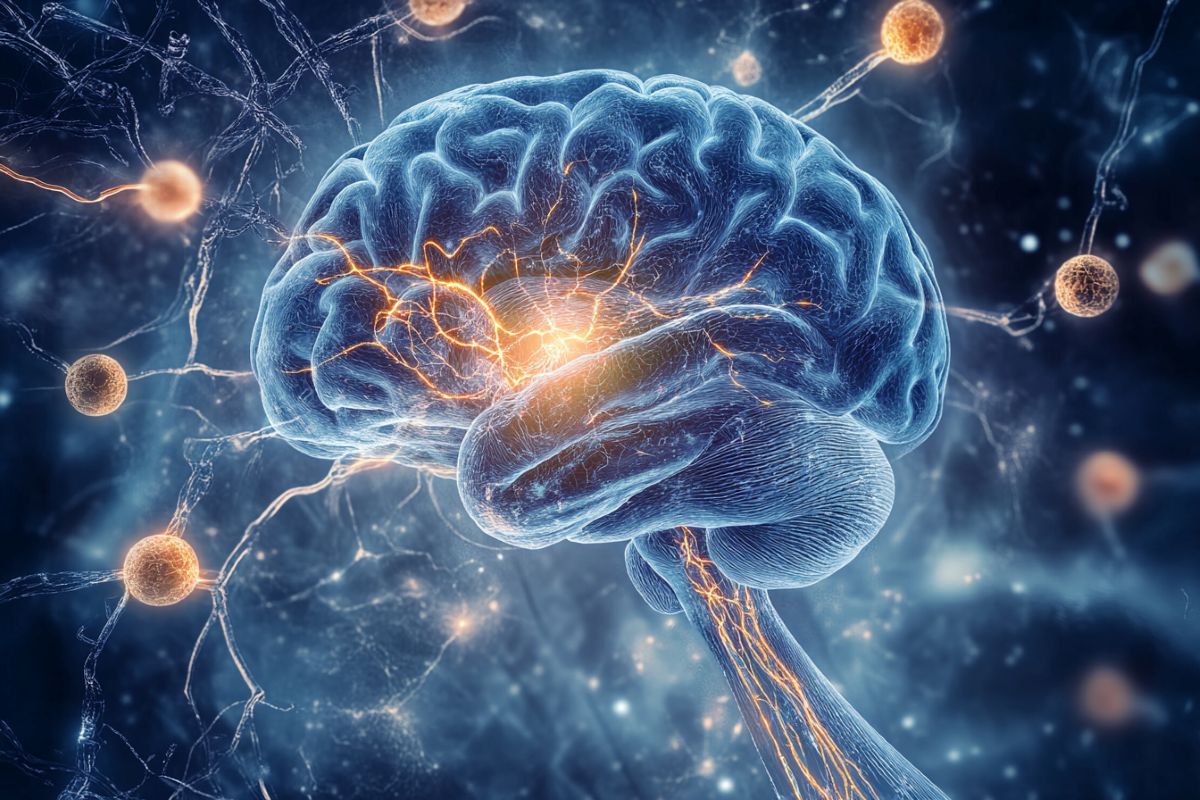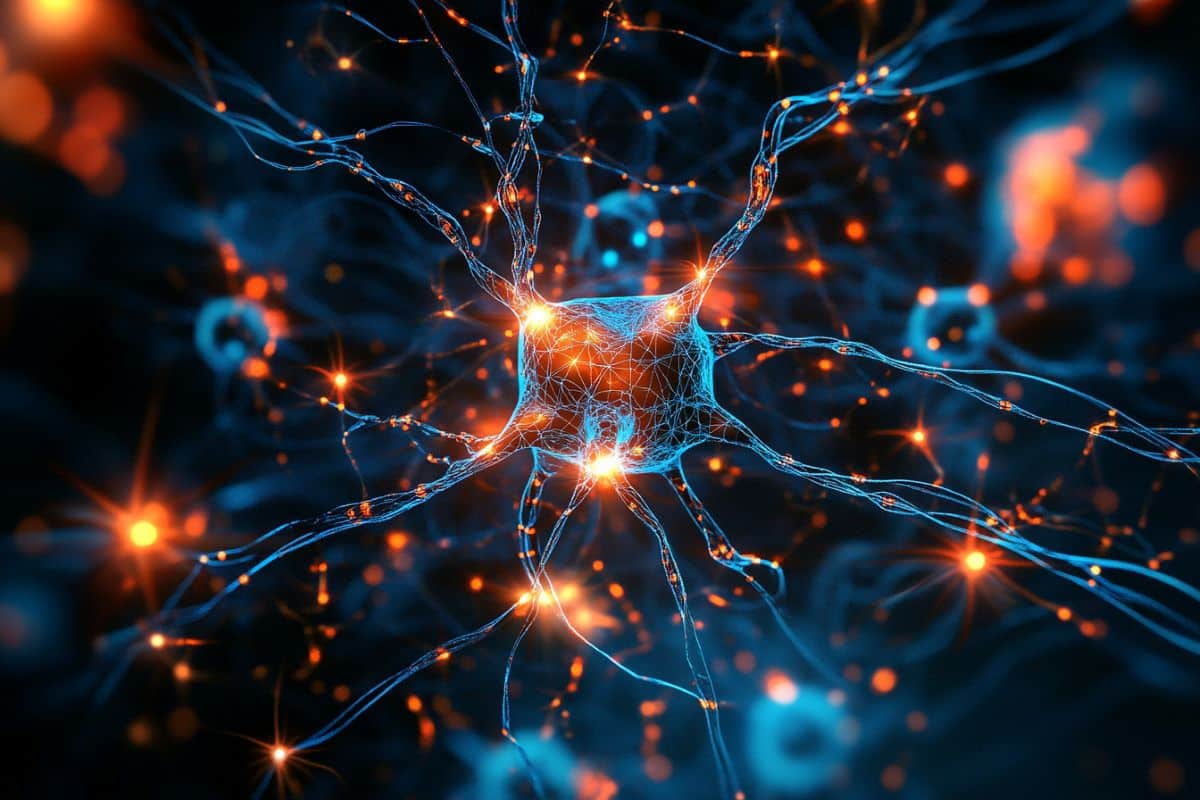Summary: New research reveals that Type 2 diabetes may impair the brain’s reward and memory processing in ways that mirror early Alzheimer’s disease. The study focuses on the anterior cingulate cortex (ACC), a brain region responsible for motivation and emotional regulation, and its interaction with the hippocampus.
In diabetic rodent models, researchers observed muted reward signals and impaired memory processing linked to elevated blood sugar levels. These changes may help explain the elevated Alzheimer’s risk in people with diabetes and point to new avenues for early intervention.
Key Facts:
- Impaired ACC Function: Type 2 diabetes weakens reward and memory signals in the anterior cingulate cortex.
- Link to Alzheimer’s: The disrupted ACC-hippocampus connection mimics early Alzheimer’s cognitive changes.
- Potential Treatment Target: Findings highlight this brain circuit as a new avenue for interventions in diabetes and mood disorders.
Source: University of Nevada
Type 2 diabetes may rewire the brain in ways that mimic early Alzheimer’s disease — and UNLV researchers say the “why” may lie in a previously unexplored connection between high blood sugar levels and a key part of the brain called the anterior cingulate cortex (ACC).
Diabetes is a group of diseases characterized by an imbalance of blood sugar or insulin levels. Scientists have long known that Type 2 diabetes patients are more prone to psychiatric and neurodegenerative disorders. The risk of developing Alzheimer’s is 65% higher in diabetics. But the exact link between diabetes and neurodegenerative diseases has been poorly understood.
The UNLV research team went searching for answers.
Based on their findings, published this week in the Journal of Neuroscience’s Computational Properties of the Prefrontal Cortex Special Collection, it appears that diabetes weakens ACC function — suppressing reward perception and memory signals — and induces mild cognitive impairment similar to that observed during the brain’s progression towards Alzheimer’s disease.
“Diabetes may be altering the brain similarly to early stages of Alzheimer’s disease,” said lead researcher and UNLV psychology professor James Hyman. “Further research is needed but these findings have the potential to help researchers unlock clues to improved diagnostic or treatment strategies for the disease.”
The study builds on the UNLV team’s previous research into the link between diabetes and Alzheimer’s, and represents the first time scientists have looked for clues within the ACC.
The ACC is associated with fundamental cognitive processes — ranging from motivation, decision making, and learning to goal-oriented behavior (such as tracking tasks and experiences over time), pleasure seeking, and reward processing.
The ACC’s role in regulating emotions also makes it integral to brain patterns observed in patients experiencing mood disorders and depression.
To gain insight into the interplay between the ACC and high blood sugar levels, scientists observed brain activity and behavior in rodent models.
Researchers found that diabetics’ anticipation of a reward, such as a sweet treat, is heightened in comparison to healthy brains. Additionally, after receiving the reward, healthy-brained subjects pause to savor, while the diabetics quickly move on to the next reward.
According to scientists, hyperglycemic insulin levels appeared to impair the ACC’s information-processing ability surrounding rewards. The researchers pinpointed the weakened reward signal to a dampened input into the ACC from another key brain area for Alzheimer’s disease called the hippocampus, which is involved in spatial and autobiographical memory.
“We think the hippocampus tells the subject where it is location-wise, and the ACC tells the subject what it is doing and that it’s getting a reward,” Hyman said. “These things should come together and make the subject remember it was just in a special, rewarding location, but this doesn’t happen with the ones that have Type 2 diabetes.”
The research team called their findings significant, given the importance of diet and lifestyle interventions to manage diabetes. Globally, 1 in 10 people contend with the illness, and 90% of cases are Type 2 diabetes — which is linked to obesity and can lead to chronic damage to nerves, blood vessels, and surrounding tissues and organs.
What’s more, study authors said, the hippocampus-to-ACC projection may be worth exploring as a treatment target for mood disorders to which the ACC is already linked. Hyman said his team’s research reveals direct evidence of muted reward processing and behaviors that are consistent with anhedonia, or the inability to experience pleasure — a common symptom of depression and Type 2 diabetes.
Additionally, he said, the circuit between the ACC and hippocampus is integrally important during the early stages of Alzheimer’s pathology. His team plans to continue its investigation into the connection between the neurodegenerative disorder and weakened ACC function.
“Alzheimer’s disease goes undetected for decades because our brains are good at finding ways to compensate. Before diagnosis, people behave normally despite having changes in information processing. We even observed that in this study,” Hyman said.
About this diabetes and neurology research news
Author: Keyonna Summers
Source: University of Nevada
Contact: Keyonna Summers – University of Nevada
Image: The image is credited to Neuroscience News
Original Research: Closed access.
“ACC reward location information is carried by hippocampal theta synchrony and suppressed in a Type 2 Diabetes model” by James Hyman et al. Journal of Neuroscience
Abstract
ACC reward location information is carried by hippocampal theta synchrony and suppressed in a Type 2 Diabetes model
The anterior cingulate cortex (ACC) is important for higher order cognitive functions, emotional responses, and monitoring internal states.
ACC dysfunction has been implicated in an array of psychiatric and neurodegenerative disorders which have a bidirectional relationship with the metabolic disorder Type 2 diabetes (T2D). T2D is a chronic disease characterized by hyperglycemia, loss of insulin signaling, neuroinflammation, and increased morbidity and mortality chances.
To better understand the functional effects of T2D on ACC information processing, we delivered an intermittent, low dose streptozotocin (STZ) protocol to rats (all male due to female insensitivity to STZ) which led to lasting hyperglycemia and recorded single neurons during a delayed alternation task.
We observed changes in spatial and reward processing in spite of no differences in overall behavioral accuracy, though we did find hyperglycemic animals spent less time at the reward site. Hyperglycemic animal (n=5) ACC neurons had higher spatial information scores and changes in the allotment of spatial coding assets.
Specifically, the hyperglycemic group had greatest spatial information during the reward approach, while in controls (n=3) it was uniformly distributed. We found that state space separation and decoding accuracy were greater in control ensembles at the reward location.
Furthermore, control hippocampal theta phase-locked cells had the strongest reward coding and this effect was absent in hyperglycemic animals, leading to a muted reward representation, despite increased reward approach coding. T2D inferred a nuanced and layered effect on ACC activity, leading to reward coding deficits and a differential change in spatial coding properties.





